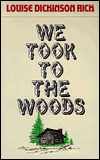Therefore, I have in my refrigerator, as a gift, more eggs than I need -- and they are not like the store bought eggs I'm used to. These are a bit smaller, but that's not a problem, not really, not for most things. What has me feeling like a novice cook is that these eggs have deeply orange, high yolks, quite different from the flat pale ones I've grown up with. The whites seem different, too. These eggs whip up into something not at all what I've come to expect. It's almost like moving to a foreign country or something when the commonplace task of scrambling eggs presents itself as something new. And let's not talk about me standing poised above cake mix, wondering if there was some adjustment I should make to offset the use of exotic eggs. It is odd, all these years after becoming a cook, to find myself stopping to wonder about such things.
One of the things that strikes me funny about all this is that for as long as I can remember, I have run into people who think they want to raise chickens. If they want to go back to the land and be a child of nature, they dream of raising chickens. If they want to go into business for themselves, they often dream of raising chickens. If they've lived in the city and want to retire to a pastoral life, the picture they paint tends to include feeding chickens. And yet I know precious few people who have the first idea about actually raising chickens. They do like the sound of it, however.
As far as I can see, this has been a national weakness for generations in America. Certainly, there have been some funny accounts in literature and in movies, wherein it is acknowledged that people do tend to expect more from chicken farming than it is likely to provide. I've also heard some awfully funny family stories told at the expense of people who caught egg fever, so to speak. (In reading English literature, I've noticed that fictional characters often dream of beekeeping or raising turnips or beets. Why is that? Is that equivalent to our personal chicken flocks, do you think? I haven't noticed the parallel disasters-brought-on-our-own-head comic stories about the inevitable failures, though. Hmmm. Do Europeans take such things more seriously, or sweep them under the rug, or what? Have I just read too narrow a range of books?)
Anyway, just in case the present generation doesn't know what is probably the most famous we-decided-to-be-chicken-farmers account out there, this is it.

Egg and I
I haven't read it in years, and I made the mistake of reading it in a flurry of we-chose-to-become-self-sufficient books (like We Took to the Woods by Louise Dickinson Rich, which is another American classic) so my memories of it are a bit muddled (along with all the other books I read in that binge). But I remember it was funny. It also spawned a host of films. (See Adventures of Ma & Pa Kettle, Vol. 1)
I'm pretty sure I liked We Took to the Woods better than The Egg and I, but to each his own.
While I'm on the subject of self-sufficiency, I'd be a bit remiss if I didn't mention a modern-day homesteading-experiment-that-didn't-go-as-planned here in eastern Oregon. The author, Jane Kirkpatrick, has gone on to become a popular Christian fiction author, but the nonfiction Homestead is the book that put her on the map around here, back in the early/mid-1990s. You gotta love a couple of city folk who move to a place called Starvation Point with high hopes... Especially, perhaps, when one of them is a mental health professional...

Homestead: Modern Pioneers Pursuing the Edge of Possibility
So, what other books in this vein do you know about? If there are any you'd recommend, please leave info in the combox. If you've done a review on one, feel free to leave the link info. Thanks.
Related post: Good Book: Dear Mad'm, by Stella Walthal Patterson


No comments:
Post a Comment